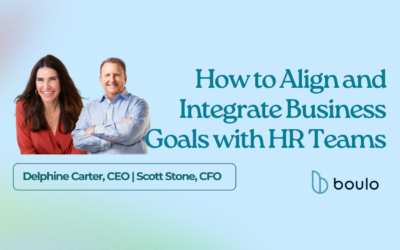Building your company culture is vital to attracting and retaining employees, affecting company productivity and profitability. Ben Bradbury of Subject Matter by Astutely and Boulo’s Delphine Carter discuss key points to building a positive culture that accommodates caregivers.
Why? Because caregivers are the backbone of our economy and keeping them in the workforce is critical. Some issues addressed in the podcast are touched on below. Listen in for real-life examples and ideas on how to best build your company culture.
Support Caregivers
Almost everyone is a caregiver at some point in their lives. If not, there comes a time when we all require care. Does your culture accommodate your employees who are also caregivers?
Flexibility
One of the keys to creating a culture that welcomes caregivers is flexibility. The key to a productive, flexible culture? Hint: it involves measurable metrics. Consider offering flexibility in hours, location, and/or culture to create the best employee experience for caregivers.
Unintentional Language Bias
A culture factor that’s easy to overlook but important in creating a caregiver-friendly environment is language. Bias can creep in everything from your job descriptions to how you talk about your culture. Unintentional language bias can lead to assumptions that may inadvertently squelch careers.
“We talk about phrases in an office that have a lot of parental bias, unintentional bias. When people say, ‘Oh my gosh, Fred’s so committed. He’s here until 8:00 PM every night.’ I don’t know that that language is healthy at all. Just because somebody has to be home at five doesn’t mean they’re any less committed. Who’s actually producing more? Where are the results that show that Fred’s more committed than Beth or Bill, who need to leave at five?”
-Delphine Carter
Intentional Communication and Celebration is Key in Creating Culture
Even the way a company chooses to celebrate hitting a monthly goal can cause issues for caregivers. Who wants to show up at daycare pickup after a work happy hour celebration? It’s a gut punch to parents, who don’t want to miss out on company bonding either. But luckily, there are other ways a business can celebrate its goals.
Remote and Hybrid Work Environments
Communication and celebrations are also complicated by today’s remote and hybrid workforce environments. Adding to the complexity is that studies show people of color and caregivers will be the least likely to come into the office if they have the choice. So how can companies build a culture that is inclusive of all people, and regardless of location? A key factor is intentionally communicating as if everyone was remote. For instance, our Boulo team incorporates Slack as an integral part of our communication. . If you assume everyone is remote-first, then your communication will never unintentionally omit your remote workers. Example: When you schedule any meeting and are booking a meeting room, always include a remote access option.
Leaders and Relearning Relationships
Leaders also need to look at how they interact with people coming back to the office and people they see mainly over zoom. Trust-building exercises may be in order. To build your culture, try setting up mentor relationships that are intentional but not prescriptive.
“After 19 months away from the office, a lot of us are coming back with trepidation. We’ve had children; we’ve lost children. We’ve been married; we’ve had marriages go away. We had a mullet. Now we don’t. We’ve had a beard. Now we don’t.
And so, you almost have to re-learn people. A lot of us had significant shifts that happened during COVID. Once you get back into the workplace, I wouldn’t assume, as a leader, that you know where everybody is in their life based on a few zooms and how that relationship was back in 2020. Leaders can establish trust time to rethink and rebuild those relationships.”
-Delphine Carter
Employee Burnout
Identifying signs of employee burnout may be different may also be different in remote and hybrid settings. In the office, you might hear frustration mounting or see physical stress indicators. If the team member is remote, you won’t have those cues unless you are on a call.
Ask remote workers how they’ll show you they are burning out: Will they mentally “check out?” Will they ask for time to express frustration? Will their work quality suffer? Once you know, you can help them avoid burnout or catch it before a big event.
Labor Force Shifts and Soft Skills
Additionally, the pandemic has caused a shift in the labor force. Although job openings are plentiful, overall unemployment remains high as many people seek to transition into other roles. Taking this shift into account is another key to building your company culture.
One way to do this is to consider people who are up-skilling and re-skilling for all open roles. When filling an open position, take a person’s soft skills into account and the training they had to acquire new skills. Look at the overall picture of the person to see how well they will perform and how they can contribute both to the role and to your company’s culture.
“There’s about five soft skills where you can take examples from your past life and show that by combining your new skill and these soft skills, you will be the most incredible employee. It’s leadership, teamwork, execution, innovation, and productivity.”
-Delphine Carter
Company Culture Fit
Speaking of how people may or may not fit into company culture, you will learn about dealing with the “aberrant genius” within a small company or team. How you deal with disruptive but productive employees is essential to your overall culture.
Meaning of Company Culture
Running a company while raising children is no easy feat but provides a real-life example of building a caregiver’s culture. It can also be beneficial to the children involved. It’s part of balancing work and life and helps define a healthy meaning of company culture.
“I think ultimately that’s what culture should bring. The wellbeing of the people.”
-Delphine Carter
The Subject Matter podcast, hosted by Ben Bradbury, helps business leaders build powerful relationships with empathetic communication. The podcast explores how CEOs have a unique opportunity to create culture. Having a strong culture improves employee retention, attracts new customers and employees and lets you build an aligned organization rapidly and fully remotely. Ben Bradbury is also the founder of Astutely, which supports CEOs in building culture at scale.





0 Comments